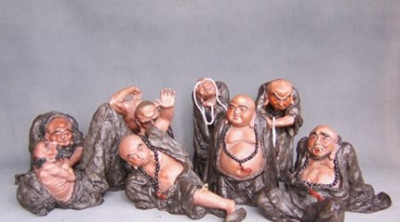Liu Tingxun, as a very high-ranking official in that state, brought two ceramic bureaucrats with him into his tomb, presumably to take care of the everlasting admin. Oliver Moore has studied this elite bureaucratic class, which has become so synonymous with the Chinese state that we still refer to senior civil servants as mandarins:
高級(jí)官員劉廷荀用兩個(gè)官員俑陪葬,想必是為了確保自己永世的行政權(quán)。奧利佛摩爾教授一直在研究精英官僚階層,這個(gè)階層逐漸成了中國(guó)政府的同義詞,如今我們?nèi)砸浴癿andarin (官員)”一詞指代高級(jí)公務(wù)人員。
"Administration was a bureaucratic operation. It combined very old aristocratic families with what we could call new men. They were divided into various ministries-public works, the economy, there was a military board-and then the largest of all, the one in which more officials were involved than in any other activity, was ritual, with something like between 30-50 per cent. And they would organise recurrent annual or monthly rituals, celebrations of the emperor's birthday, or princes'and princesses'birthdays, seasonal observances-things like the ploughing rite, where the emperor would open the agricultural season by symbolically ploughing a field somewhere in the palace.
當(dāng)時(shí)的官僚系統(tǒng)由古老的侯門(mén)與我們可以稱之為新貴的階層共同構(gòu)成,他們分屬不同的部門(mén),工部,戶部,兵部以及規(guī)模最大的禮部。禮部官員會(huì)組織各種周期性的儀式(每年一次或每月一次),比方為皇帝、皇子和公主舉辦壽宴,以及農(nóng)業(yè)節(jié)氣,如演講:每年春天,皇帝都會(huì)在宮內(nèi)象征性地犁一下地,宣布春耕開(kāi)始。
"There was a very small group, whose significance grew throughout the Dynasty, who took examinations and competed for state degrees. Later on, this system becomes magnified. So that by about the year 1000, you have something like 15,000 men coming to the capital to take exams, of whom only around 1,500 would get a degree. So this is a system in which the largest number, well over 90 per cent, will fail-repeatedly for the whole of their lives. And at the same time, this is a system which fosters loyalty to the Dynasty-which is quite remarkable really."
還有一類(lèi)官員則通過(guò)科舉考試獲得官職。起初他們?nèi)藬?shù)很少,但逐漸成了官僚系統(tǒng)的重要組成部分。科舉考試的規(guī)模也逐年擴(kuò)大,至公元一千年,有約一萬(wàn)五千人赴都城應(yīng)考,其中一千五百人能夠金榜題名,九成以上名落孫山,為數(shù)眾多的人終其一生部在不懈趕考。這一科舉制度同時(shí)也保證了官員對(duì)朝廷的忠誠(chéng)度。












